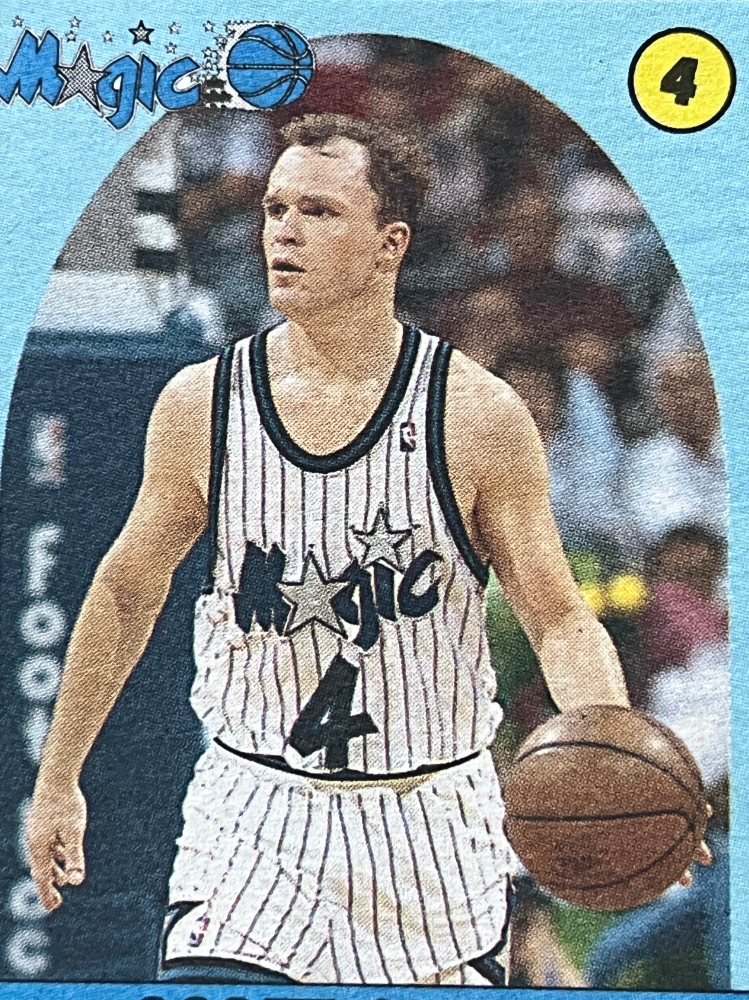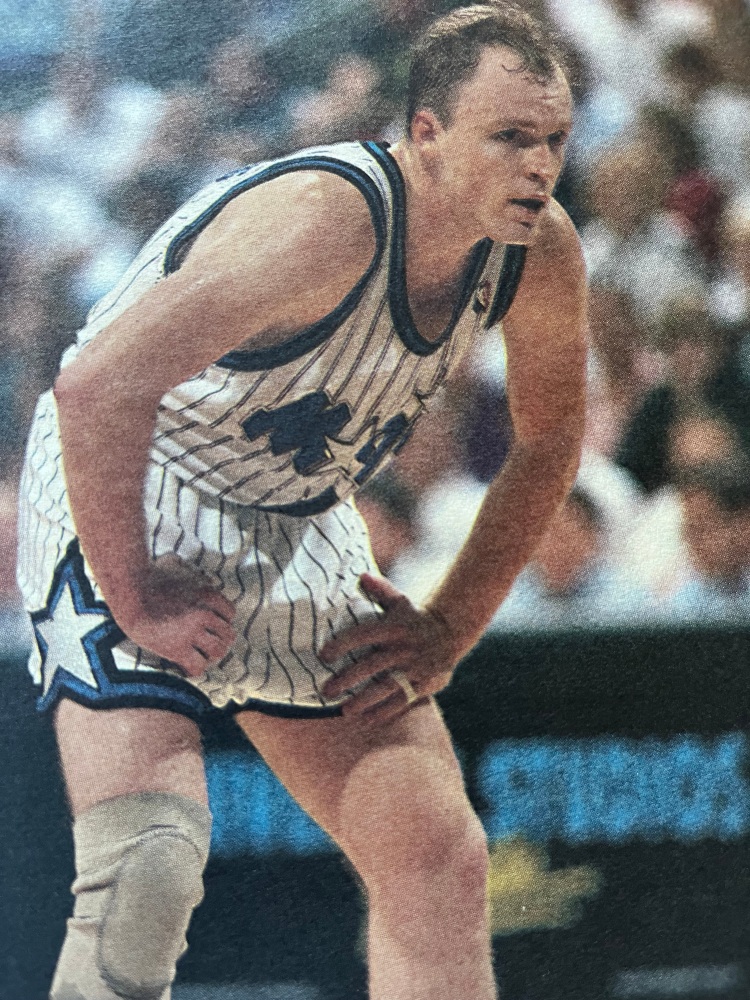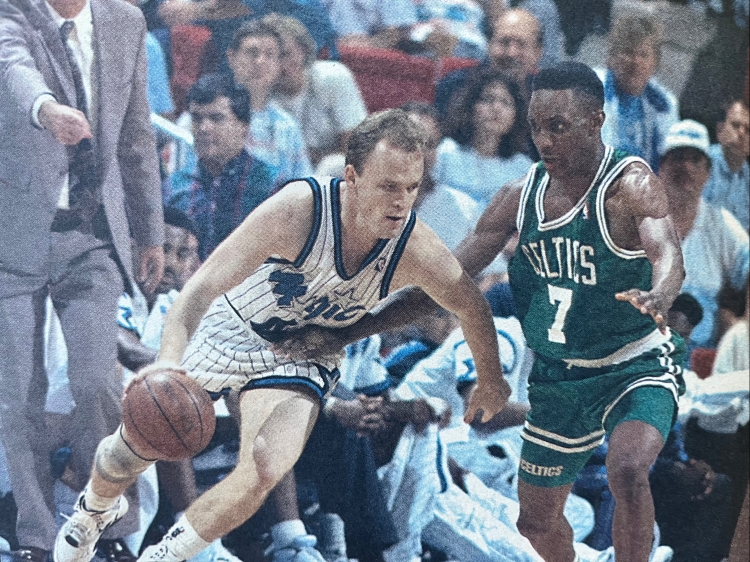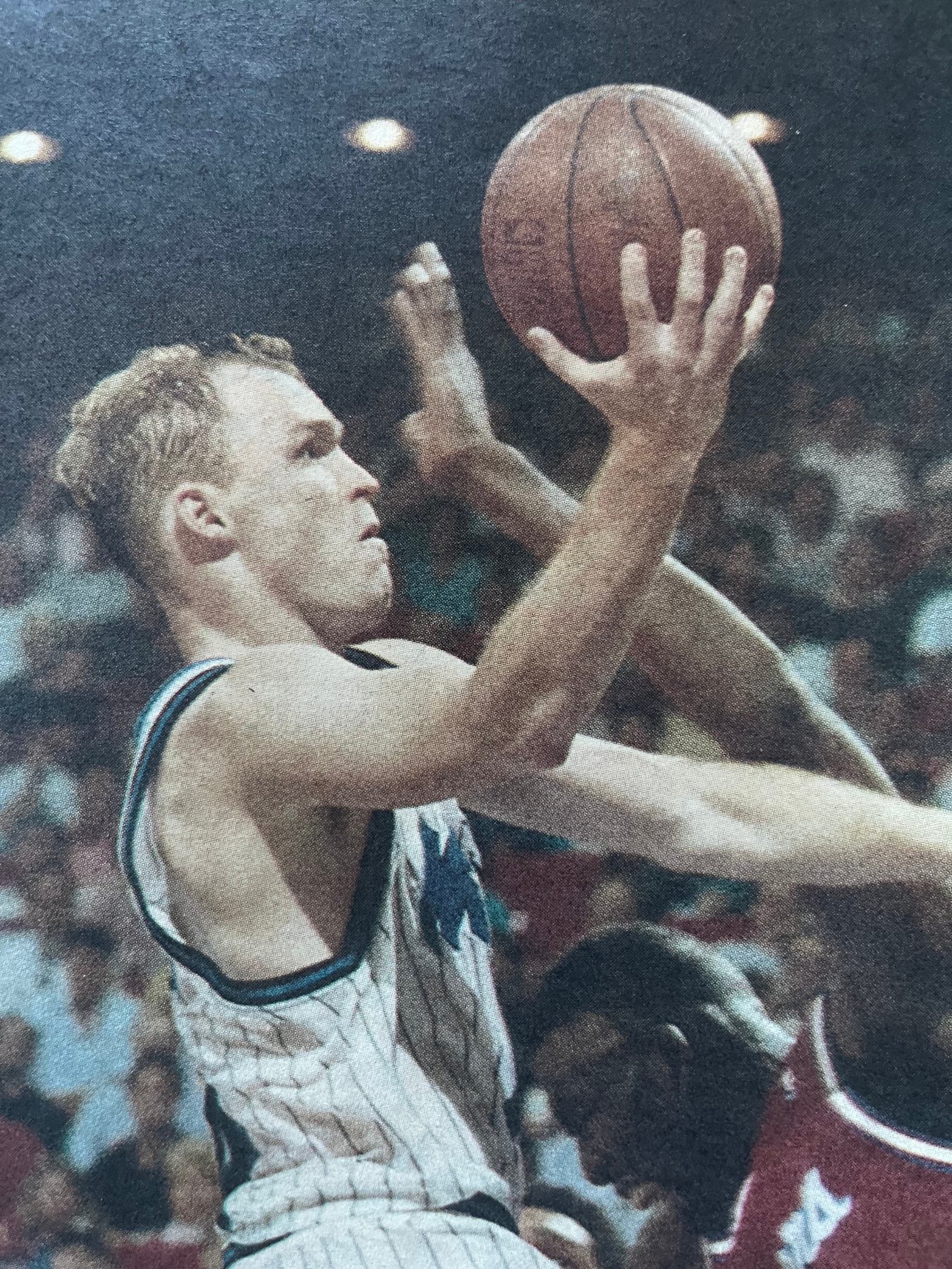[Looking back at the 1989-90 NBA season, Rick Barry’s Scouting Report once wrote, “It was a fascinating phenomenon: Everywhere you looked last season, quality point guards were coming out of the woodwork . . . In Houston, Kenny Smith, a bust in his first three years, finally emerged as a player . . . In Indiana, Michael Williams, who had been on four teams in three years, proved to be the solution to the Pacers long time search for a primetime 1 . . . And, as a lesser example, Sacramento’s Jim Les, who had started the season in the CBA, led the league in three-point percentage . . . Perhaps the most remarkable ‘excavation,’ however, occurred in Orlando.”
That would be the remarkable excavation of Scott Skiles. In this brief article, from the June 1991 issue of Magic Magazine, writer Bill Doughty explains more about the excavation and Skiles’ rapid rise as an NBA star and one of the NBA’s fiercest competitors around in the early 1990s.]
****
They say it ain’t braggin’ if you can do it. The past season proved emphatically that Scott Skiles ain’t been braggin’.
Throughout his first four years in the NBA, including his first year with Orlando, the 6-feet-1 Skiles was a bit player. Hampered by injuries, he languished on the bench in Milwaukee and Indiana before coming to the Orlando Magic in the 1989 expansion draft, where he still found himself in a backup role. Yet all along, Skiles insisted that he could deliver the goods if he got a significant amount of playing time.

Then this past November, Magic point guard Sam Vincent went down with a pulled hamstring. Skiles came in, and Vincent became basketball’s version of Wally Pipp, the player who lost his spot to Lou Gehrig, the baseball Yankee’s legendary “Iron Horse.”
To say Skiles did the job is an understatement. He responded to this opportunity with a career year, leading the Magic in scoring (17.7 points a game) and assists (8.4). He set an NBA single-game assist record against Denver in December. He set career high marks in virtually every category. His play was a primary reason the Magic went from 18-64 in their first year to 31-51 this season.
“Scott has led this team to a season that was beyond everyone’s expectations,” said Magic general manager Pat Williams.
For his efforts, Skiles was rewarded with a new four-year, estimated $8 million contract and was named the NBA’s Most Improved Player. If outside observers were surprised by the turnaround, Skiles—who is nothing if not self-confident—was not.
“I haven’t surprised myself. I just needed a chance to play,” he said. “I feel like I’ve just scratched the surface.”
It really shouldn’t have been a surprise to anyone who has followed Skiles’ career, one that has consistently found him in the role of the underdog, labeled too slow and/or too short. But he has always proven the critics wrong. He proved it in high school, single-handedly lifting tiny Plymouth to the Indiana state championship over a school with three times the number of students. He proved it in college, where he took Michigan State to back-to-back NCAA tournament appearances and earned All-America honors as a senior.
Skiles became the Milwaukee Bucks’ first-round pick in 1986, the 22nd selection overall. He stood ready to disprove the critics who said he would never be an NBA star. But his pro career became one giant frustration. A back injury kept him out of all but 13 games as a rookie, and Milwaukee dealt him to Indiana.
While it seemed an ideal move for a local hero, the injuries continued. Ankle and knee problems limited him to 51 games his second season. Finally, an injury-free year his third season allowed Skiles to show he could play regularly. He led the Pacers in games played (80) and ranked third in the NBA in free-throw percentage. But he was still left unprotected in the expansion draft, and it was on to Orlando.
Even on one of the league’s newest teams, Skiles still couldn’t work his way into the starting lineup. He was the relief man for Vincent, averaging roughly 21 minutes, eight points, and five assists a game. But given the chance, he showed flashes of brilliance. In a rare starting assignment, Skiles responded with a triple double: 23 points, 17 assists, and 12 rebounds.
Entering the team’s second season, though, there were questions if Skiles would ever be on the team when the Magic took the floor. If the team opted for a guard in the draft, some speculated, Skiles was gone.
A restricted free agent, Skiles was looking to ink a new contract for somewhere in the neighborhood of three years at $600,000-$800,000 annually. But Williams, who still doubted Skiles’ ability to be an NBA regular, said no. Instead, the Magic gave Skiles the minimum 25 percent raise and planned to continue talks through the season. He was sorely disappointed.
“I want to stay in Orlando,” Skiles said last summer. “I’ve made that clear, and that’s why the non-interest from the Magic is so disappointing. The fans there have never really gotten to see Scott Skiles play the way he can.”
But the Magic drafted Dennis Scott, Skiles stayed, and the fans got their chance to see just what he can do. Skiles’ approach to the game can be summed up in a variety of one-word adjectives: intense, scrappy, aggressive, fearless, combative, cocky, maniacal—well, you get the idea. However you want to describe it, the attitude has been contagious.
“He’s talking to us all the time, getting on our butts,” center Greg Kite said during the season. “Sometimes, I just tell him to shut up. But most of the time it just makes me try harder.”

Indeed, Skiles is just as likely to get into a teammate’s face as he is into an opponent’s. And the Magic responded. At times Skiles’ will seemed to lift the team to win games they shouldn’t have won. “I’m going to be intense, and I’m going to yell, and I’m going to try to get my guys going,” he said.
It is a style Magic fans have embraced. Even last year, when he was a part-time player, the fans voted him the team’s most valuable player (an embarrassing turn of events that led to the award being changed to the fans’ favorite player).
But it was not always thus. Skiles’ win-at-all-costs attitude caused problems on the court throughout his career, and his penchant for walking on the wild side off the court caused even more.
He was embroiled in two highly publicized incidents during his college days involving charges of drunken driving and possession of marijuana. Ever straightforward, Skiles admitted his mistakes, accepted his punishment, and put the incidents behind him.
Marriage and the birth of his first child, Scott Jr., have mellowed his off-court persona. But when the ball goes up, Dr. Jekyll will always turn into Mr. Hyde. “Put me into a game, and I just kind of turn. I can’t help it,” Skiles said. “I want to win because I hate losing more than anything else in life. I can’t stand being on the losing side. Not ever.”
While the Magic weren’t a winning team, Skiles was nevertheless delighted at the team’s improvement this year. And, of course, the accomplishments and accolades that followed were a vindication for him.
Now his star is on the rise, and Skiles is eagerly looking forward to a new season, where he intends to prove this season wasn’t a fluke. So long as he stays healthy, expect to see Skiles on the floor most of the time.
“There were many nights he just forced me to play him for 48 minutes,” head coach Matt Goukas said. “When he is on top of his game, there is no other guy I would rather have in the game.”
“I think I’ve proved I belong in this league,” Skiles said. “I hope to be proving that for a few more seasons.”
And that ain’t braggin’.

[As an added bonus, let’s take a look back at Skiles’ record 30-assist outing on December30, 1990. Pretty cool story from the Orlando Sentinel the next day. The byline belongs to Barry Cooper.]
This morning the NBA can begin clearing space in the record books because, now, Scott Skiles belongs. The Orlando Magic guard, talked about all over town and loving every second of it, racked up an NBA-record 30 assists Sunday night Sunday night in the Magic’s 155-116 rout of the Denver Nuggets.
So what if the incessant trade rumors about Skiles going to the Detroit Pistons prove to be false? Skiles, who admits, he loves to perform under pressure, is a player forever in search of a stage, and he found a magnificent spotlight, Sunday.
Kevin Porter, who registered 29 assists with the Nets in 1978, previously held the mark, but Skiles tied the record with 6:57 left on a feed to Jerry Reynolds, who dunked.
Then came some tantalizing moments at Orlando Arena. The announced sellout crowd of 15,077 informed by the public-address announcer, knew Skiles was in reach of the record, and they cheered his every move. The Magic were ahead by 40, but that didn’t matter. All the fans cared about was seeing Skiles make history, and they agonized as Skiles, needing just one more assist to set the record, hit the open man eight times, only to see his teammates miss.
On three occasions, Reynolds drove to the basket rather than immediately take the shot that might have given Skiles the record. Reynolds later said he had been unaware Skiles needed one more assist.
Finally, with 19.6 seconds left, Reynolds took a pass from Skiles, pulled up, and dropped in a 20-foot jumper. Reynolds, as he always does, turned and nonchalantly ran back on defense. But Skiles broke into a broad grin, pointed to Reynolds, and nodded his head. Reynolds, grinned, too.
“I guess everyone in the arena knew but me,” Reynolds said. “My shot hadn’t been falling, and that is why I was driving to the basket, then Scott came up to me, and said, ‘Hey, just shoot the ball. Help me get the record.’”
